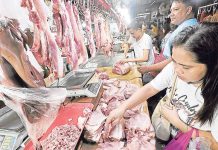PHILIPPINE inflation quickened in October driven by higher food and non-alcoholic beverage prices, according to official government data released on Thursday.
The consumer price index rose at a quicker annual pace of 2.5 percent in October, within the 1.9 to 2.7 percent forecast range of the Bangko Sentral ng Pilipinas’ Department Economic Research for the month.
Core inflation which strips out volatile food and fuel items, came in at 3 percent.
“Ang pangunahing dahilan sa pagtaas ng inflation sa buwan ng Oktubre 2020 ay ang mas mabilis na pagtaas ng presyo ng food and non-alcoholic beverages,” said National Statistician Dennis Mapa.
The increase was attributed to higher inflation for meat and fish, Mapa said, with meat at 4.7 percent and fish at 3.7 percent.
Barbershop services and education also contributed to the faster inflation for the month bringing year-to-date inflation for 2020 at 2.5 percent.
The Bangko Sentral ng Pilipinas said October inflation remained consistent with its assessment of “favorable inflation dynamics” over the policy horizon.
“The balance of risks continues to be on the downside due largely to the impact of domestic and global economic activity of possible deeper economic disruptions caused by the coronavirus pandemic,” the Bangko Sentral said in a statement.
The central bank has been among Asia’s most aggressive in easing policy, cutting its benchmark rate by a total of 175 basis points so far this year, to mitigate the pandemic’s economic fallout.
It also slashed lenders’ reserve requirement ratios, and pumped over a trillion pesos worth of liquidity into the financial system. The central bank has two more policy meetings this year, with the next one scheduled for Nov. 19, after the release of third-quarter GDP data on Nov 10.
Inflation in September slowed to a four-month low driven by lower food and non-alcoholic beverage prices.
The Philippines is forecast to see a 6.9 percent economic contraction this year, the World Bank had said, the biggest since the 1980s and worse than the government’s projected 5.5 percent decline.
Its recovery has been constrained by an unrelenting first wave of infections since March, limiting its ability to fully reopen businesses, and restart domestic and international tourism.(with Reuters/ABS-CBN News)







